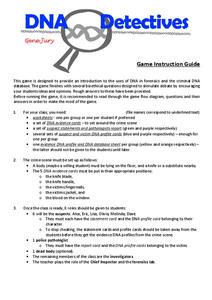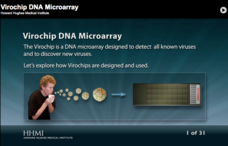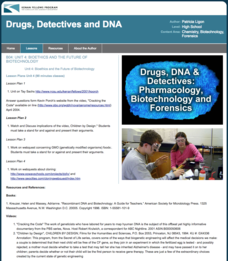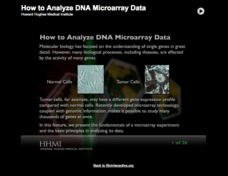Howard Hughes Medical Institute
Lactose Intolerance: Fact or Fiction
Around the world, about 2/3 of adult humans are lactose intolerant. Scholars work in small groups to discuss a few statements about lactose intolerance. Then, they watch a video on the topic and readdress each statement. Whole-class...
Biology Junction
DNA Technology
One of the first biotechnology breakthroughs occurred in 1982 with the creation of synthetic insulin. Young scientists learn about DNA technology with a presentation and accompanying worksheet. It focuses on DNA extraction and...
Biology Junction
DNA and Replication
Enzymes proofread DNA, reducing the error rate to one in one billion base pairs. Learn about the important process and so much more with the help of a presentation. It opens with the history of DNA and the major scientific contributions...
Biology Junction
Strawberry DNA
Humans eat around 93,205 miles of DNA in an average meal. Scholars learn how to extract DNA from a strawberry using a presentation. It walks through each step and explains why the process works. Comprehension questions encourage...
Biology Junction
The Structure of DNA
Did you know that all life on Earth has DNA? Explore the importance of the molecule by learning about its structure. The unique DNA shape, bases, and bonds allow the incredible diversity seen all over the world.
Biology Junction
Protein Synthesis
Watson and Crick built the first model of DNA in the 1950s, and our understanding of DNA since then continues to grow exponentially. Scholars learn about protein synthesis by observing a presentation and completing a worksheet. Both walk...
Serendip
UV, Mutations, and DNA Repair
How effective are cells at repairing UV damage? An inquiry-based lesson has learners experiment with organism by exposing them to various levels of UV light and then examining their DNA after a period of time. Pupils test different...
Serendip
DNA
Get up close and personal with DNA! A two-part hands-on activity has learners extract DNA from a small organism and then their own cheek cells. Scholars then explore DNA replication using questions to guide their analyses.
Biology Junction
Nucleic Acids
Genetic information transfers through nucleic acids, making these the chemical link that connects people to their parents and grandparents. Viewers determine the importance of both DNA and RNA after observing the presentation. Key...
Serendip
Molecular Biology Vocabulary Review Game
Getting bored with the typical review strategies? Why not turn it into a game! Learners practice their DNA vocabulary by trying to get their partner to guess the word they're describing. To complicate things a bit, there are words that...
Biology Junction
Characteristics of Life
Life exists in many different forms from tiny nanobes to the Humongous Fungus, the largest form of life. Scholars learn the definition of life and the shared characteristics of these greatly varied organisms. They demonstrate knowledge...
Biology Junction
Introduction to Biology
Welcome to Biology! Introduce pupils to a subject conceptualized by Aristotle in 300 BC through a presentation and worksheet. It covers the themes of biology, characteristics of life, the scientific method, microscopes, and measurements.
Center for Technology in Teaching and Learning
CSI: The Experience - Family Forensics
Forensic scientists depend on their observation skills to analyze evidence down to the molecular level. Middle and high schoolers practice making observations and predictions with a series of crime scene activities, which includes a...
Gene Jury
DNA Detectives
Police find a man murdered in a local hotel, DNA everywhere, and now they need scholars' help. Budding detectives step into a crime scene playing the roles of victim, suspects, and investigators. They apply knowledge of criminology and...
Howard Hughes Medical Institute
Virochip DNA Microarray
Virochips detect and identify viruses at a higher rate than other tests. Show young scientists how Virochips work to identify existing viruses. They analyze results demonstrating mutations or the evolution of viruses and view videos...
Kenan Fellows
Unit 4: Bioethics and the Future of Biotechnology
What's the future of biotechnology? Explore a hot topic in the fourth and final unit in a series of Biotechnology lessons. Learners develop an understanding of the many issues in bioethics, then create an argument for or against the role...
Howard Hughes Medical Institute
Creating Phylogenetic Trees from DNA Sequences
How closely are animals related? Check their phylogenetic trees! The use of DNA sequencing altered our understanding of these relationships. Individuals explore and gain a better understanding of how scientists sort, align, and determine...
Howard Hughes Medical Institute
DNA Sequence Assembly
Oncologists use DNA sequence data to identify specific cancers and offer more targeted treatments. Grasp an understanding of the complexity involved by learning how the body sequences and assembles DNA. Eager scientists explore the...
Howard Hughes Medical Institute
Retroviruses and Viral Diversity
Eight percent of DNA comes from retroviruses. Learn what sets retroviruses apart from other types of viruses with an presentation that focuses on the differences between viruses with a DNA genome, an RNA genome, and retroviruses.
Serendip
Cells as Molecular Factories
Cells are both made of molecules and make molecules all at the same time! An exploratory lesson provides a means for scholars to research the components of cells made of molecules and also investigate the molecule-producing power of...
Kenan Fellows
Unit 1: Introduction to Biotechnology
Biotechnology is big! Introduce the uses of biotechnology to science scholars with a fascinating, fact-filled unit. The first installment in a series of four biotechnology units covers the role biotechnology plays in human and...
Kenan Fellows
Unit 3: Genetic Variation
What happens when genes change? Junior genetic investigators examine the effects of mutation in the third unit of a four-part Biotechnology series. Individuals discover the types of mutations through a series of PowerPoints, then partner...
Kenan Fellows
Unit 2: DNA Analysis
Ever wonder how they solve those mysterious murders in TV crime dramas? The second of four units in a Biotechnology series introduces scholars to the many methods of DNA analysis. Pupils create and run their own gel electrophoresis...
Howard Hughes Medical Institute
How to Analyze DNA Microarray Data
Unravel the complexities of DNA research. Analyzing DNA data can be a daunting, time-consuming task; however, as the lesson explains, an interactive importance of the research outweighs its complexities. The presentation breaks down the...

























